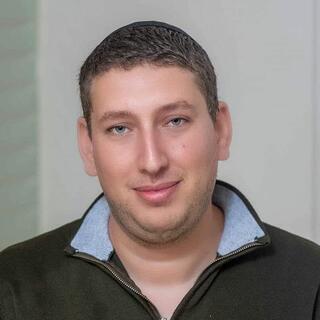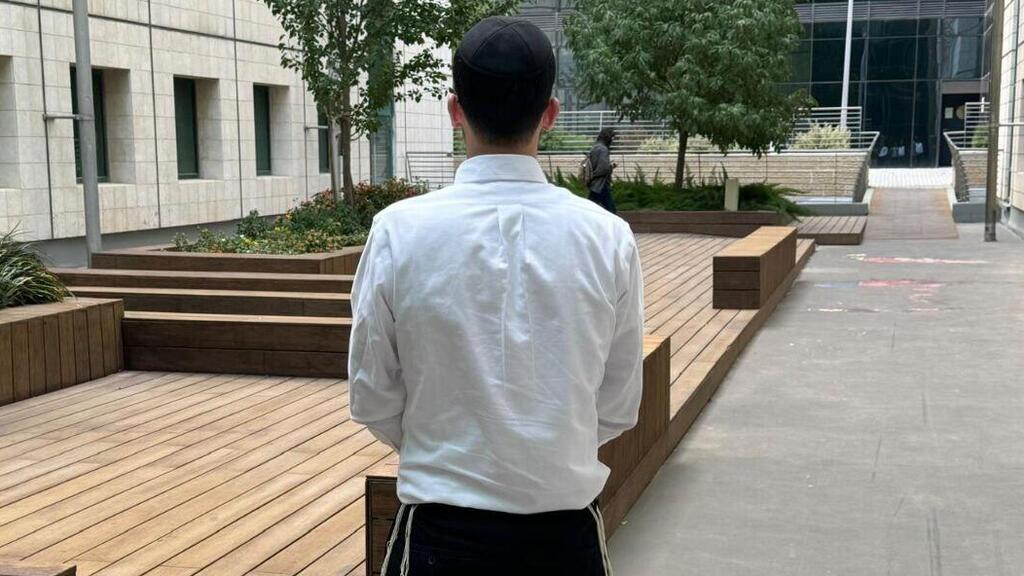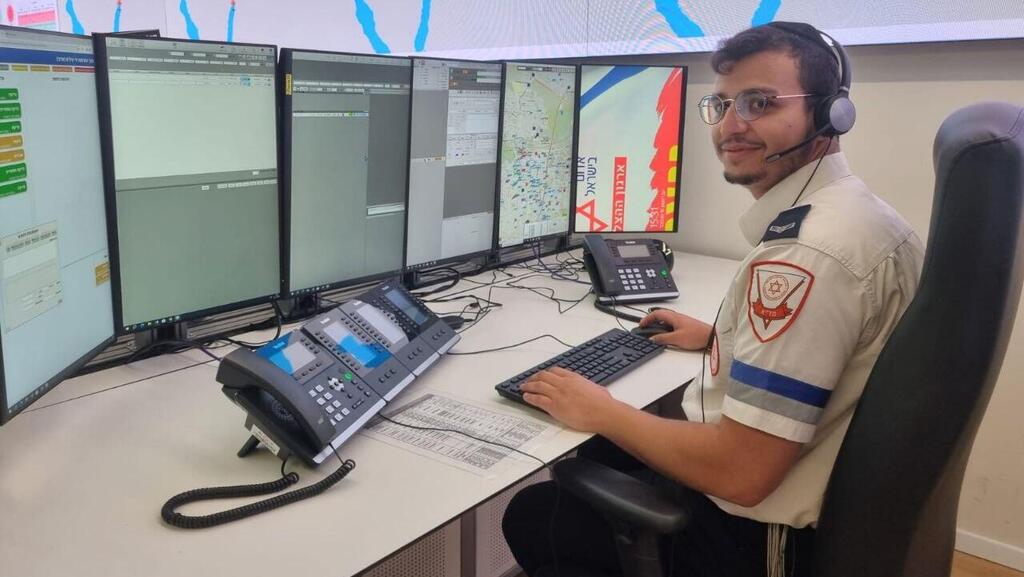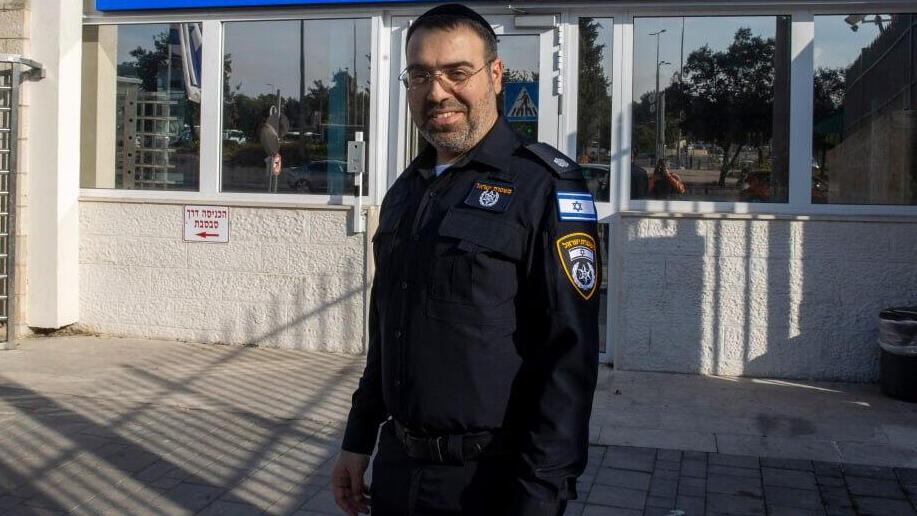While the debate over the ultra-Orthodox draft laws continues to divide Israeli society, hundreds of Haredi men are enlisting in national-civic service and integrating into security and emergency organizations like the Israel Prison Service, Magen David Adom and the Israel Police.
They feel they’ve found a place that balances their concerns about "secularization" in the IDF with a desire to participate and contribute to the country. The roles they fill are more readily accepted within the ultra-Orthodox community, as they stay out of the military uniform.
Ultra-Orthodox protest outside of IDF enlistment center
(Video: Meir Turgeman)
Yisrael, a 25-year-old Jerusalem resident, has spent his entire life in Haredi institutions. About two years ago, he joined a training and vocational program, followed by national service and was assigned to an administrative role in the Israel Prison Service.
“I grew up in a very religious community all my life,” he said. “Though we’re Sephardic, we’re conservative. I studied at Porat Yosef Yeshiva in Jerusalem’s Old City, got married and then studied in a Kollel — the typical ultra-Orthodox path.”
“After two years in the Kollel, I decided I wanted a profession and to do something for the country and society. A friend told me about the national service program that offers professional training followed by meaningful service. It suited me — it met both needs,” he added.
Yisrael joined the service before the October 7 massacre and said he felt that the brutal attacks in the south had made national service more acceptable in his community. “Today, it’s easier to talk about what was important to me back then — to be part of the national effort,” he said.
Purpose and meaning
Some 1,200 volunteers took part in the program in 2021; around 1,170 in 2022; 1,265 in 2023 and a record number of over 1,600 in 2024. About 30% of Haredi service members are in national security roles, while the rest are in civilian organizations. An 189% increase in enrollment was seen since October 2023 year-on-year.
“National service serves as a complementary tool to military service,” said Reuven Pinsky, director-general of the National-Civic Service Authority. “Ultra-Orthodox volunteers operate in hundreds of frameworks within security organizations, the public sector and civilian groups.”
Some Haredi rabbis, however, disapprove of civilian service as well. “From their perspective, it’s a form of Torah abandonment, as it’s considered aiding the state. But overall, opposition is much more marginal and less rigid,” said Dr. Asaf Malchi, a senior researcher in the ultra-Orthodox Program at the Israel Democracy Institute.
“The Haredi man in national service doesn’t wear an IDF uniform, which is a significant distinction. This doesn’t seem as if he’s leaving the camp. Haredi men have the privilege of choosing whether and where to serve,” he added.
“This option is more appealing as it often provides benefits like courses and training as well as a contribution to society. However, it doesn’t involve the unwritten contract between the citizen and the state, which includes a system of rights and obligations with sacrifice and risk as seen in combat service.”
There are over 50 Haredi national service members serving in the Israel Prison Service (IPS) today, led by Deputy Commissioner Kobi Yaakobi. For example, a new project has been launched to train data analysts and integrate them into intelligence roles.
"Military service would have been much more difficult in my environment," explained Yisrael, a new national service volunteer. "I would have felt much less comfortable doing it. I don't return home in a uniform. Anyone looking for prayer times, kosher food and gender separation can find that in organizations that know how to adapt."
Some of the trailblazers in recent years are training the younger generation who have recently enlisted. Magen David Adom (MDA) operates a call center where calls from residents requesting aid are received. Dozens of ultra-Orthodox operators, both veterans and newcomers, work there.
One such individual, Yaakov Karhi, a Haredi resident of Ganei Aylon, served in the MDA call center during his national service and now trains new recruits. "I studied in yeshiva and taught at a Talmud Torah after I got married," he recalled.
"I wanted to do something meaningful, something that would interest me and that's how I arrived at national service. MDA understands the needs of Haredi service members. The service is done while separating the genders and there holidays, Shabbat, and prayer times are taken into account."
The call center is accompanied by a rabbi who has developed comprehensive guidelines on how operators, including the ultra-Orthodox, should act in emergency situations requiring them to be present on Shabbat. Only one person is authorized to call in staff on Shabbat, with an ambulance picking everyone up from their homes.
Yaakov believes that MDA's openness to Haredi volunteers improves service to Israelis. "There’s a center in Yiddish with operators who speak the language and can respond to the needs of the strictest sects,” he added.
Perfect integration
Superintendent Barak Yosifov, head of the Israel Police’s Technology and Innovation Division in the Human Resources Department, enlisted for compulsory service in the police five years ago as an alternative to military service.
"I was married with two children when I enlisted," he recalled. "I didn’t think the IDF would be able to maintain my Haredi lifestyle. You try not to mix with the general population. It was easier in the police because we came as a group of Gur Hasidim, some Lithuanian and Sephardic yeshiva graduates. We were shown there was openness to accept ultra-Orthodox individuals and we safeguarded one another when it came to our religiousness."
Today, Barak is a father of five. He also spent many years in Torah study institutions. "I thought about enlisting," he said, "but deep down, I knew I wanted to do something meaningful. In the police, I thought I could combine the values I was raised with, such as contributing to society and living in a community.”
“There’s a genuine concern for what happens around you and it fit perfectly with my perspective. When my child came to apply for school, I came in uniform and there were no issues. My enlistment came after consultation with my rabbi with whom I still maintain a close relationship,” he added.
National Security Minister Itamar Ben-Gvir recently commented on the issue of equality in national service, saying: "I want to see as many Haredi police officers in the police force as possible. It's important and saves lives."
Yosifov believes that the police force is a better fit for young Haredim than the IDF. "We enlisted for the police through the army and did basic training there," he said. "We felt there wasn’t much understanding of the nuances of Haredi life and our needs. Both sides suffered from that.”
“The police really accommodate the Haredi community. There are programs designed for us and the integration of ultra-Orthodox commanders in training. The more Haredi police officers there are, the smaller the gap between our community and the police.”
Get the Ynetnews app on your smartphone:







